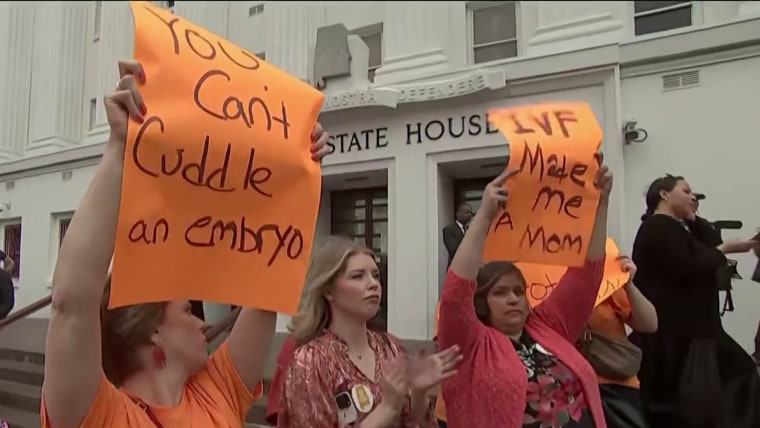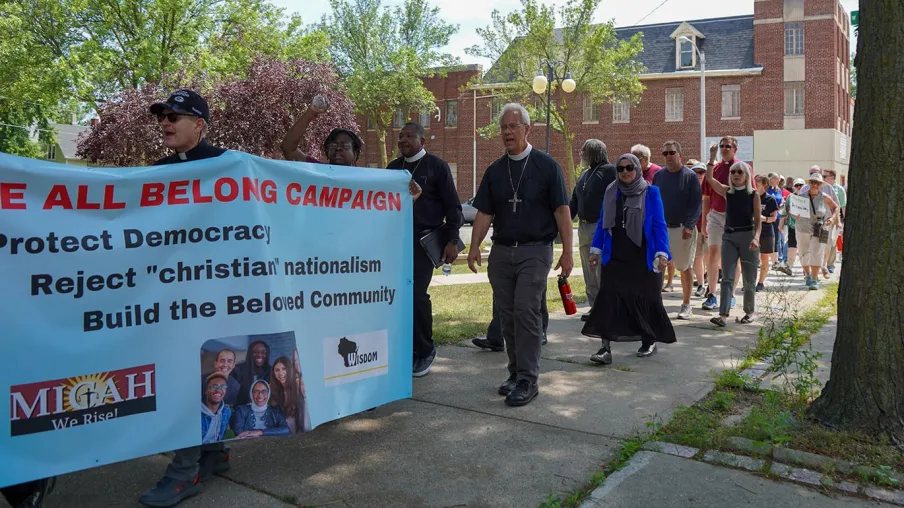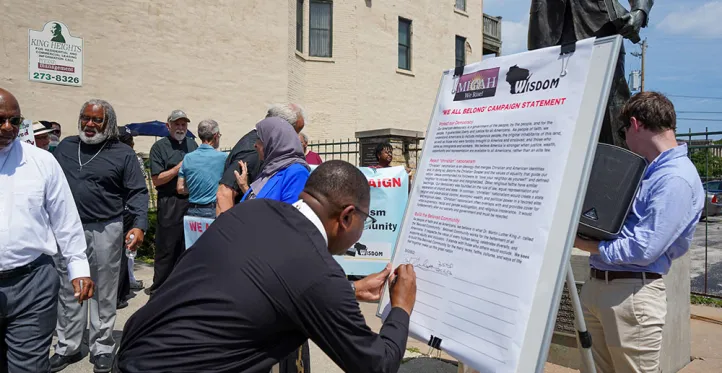By Sophia Trott and Adrish Das

On February 16th, the Alabama Supreme Court ruled that frozen embryos are to be considered the same as children under the state’s Wrongful Death of a Minor Act according to the Supreme Court of Alabama, whereas according to them, the act applies: “to all unborn children without limitation. And that includes unborn children who are not located in utero at the time they are killed.”
This has sparked significant debate not only regarding the legal and ethical aspects of in vitro fertilization (IVF) but also the ties that it has to the current presence of Christian Nationalism within our government institutions. This is due to the nonsecular nature of the rhetoric used within the different aspects of the court proceedings regarding IVF. The current influence of Christian Nationalism throughout America crucially helps to understand the implications of the ruling on reproductive rights and how church and state seemed to be intersecting.
Below, our research team rounded up some of the most interesting statements about Christian Nationalism’s influence on the ruling.
Concerning the ruling, the court’s chief justice Tom Parker stated:
“Human life cannot be wrongfully destroyed without incurring the wrath of a holy God,” he wrote in a concurring opinion that invoked the Book of Genesis and the prophet Jeremiah and quoted at length from the writings of 16th- and 17th-century theologians. “Even before birth,” he added, “all human beings have the image of God, and their lives cannot be destroyed without effacing his glory.”
Joshua Sharfstein of Johns Hopkins University went into detail describing the religious aspects of the ruling alongside providing us with an additional quote from Chief Justice Parker:
“But beyond that, the concurring decision of the Chief Justice (Parker) and of the main justice are really redolent of a theological kind of discussion. As I was reading these opinions, what really struck me is that the rhetoric sounds more like Scripture than it does the language of the law. Here’s an excerpt:
‘We believe that each human, being from the moment of conception, is made in the image of God, created by Him to reflect His likeness. It is as if the People of Alabama took what was spoken of the prophet Jeremiah, and applied it to every unborn person in the state.’”
It is clear that the ruling is embedded with Christianity in mind. Religious studies scholar Matthew D.Taylor says that:
“At that point, there’s no negotiation. There’s no compromise, there’s no like, “Oh, well, let’s meet in the middle and say let’s have a 16 week ban.” They are abortion abolitionists. What we see in Tom Parker’s ruling is more or less that rationale, using theology and Bible references to back that up and then pointing to his own belief in the Seven Mountains and saying, “This is why I did it.”
Taylor here brings up an interesting fact regarding Tom Parker and his belief in the Seven Mountains. The Seven Mountains Mandate is described as:
“A theological approach that once seemed fringe within evangelicalism but is now gaining traction. Backed by a network of nondenominational, charismatic Christians known as the New Apostolic Reformation, this mandate calls on its adherents to establish what they believe to be God’s kingdom over the seven core areas of society, including the government.”
The Seven Mountains Mandate is the heart of Christian Nationalism, whereas individuals who practice Christianity believe in a religious mandate that dictates the functioning of the country as a whole; a uniform belief that must be accepted by all. Many individuals have vocalized their concern following this Alabama ruling and the inherent religiosity that is being presented in the rationale. Referencing Tom Parker’s rationale, University of North Florida professor Julie Ingersoll, who studies religion and culture, proclaimed that:
“He framed it entirely assuming that the state of Alabama is a theocracy, and that that is a legitimate way of evaluating laws and policies…it looks like he decided to just dismiss the history of first amendment religious freedom jurisprudence at the federal level, and assume that it just doesn’t apply to Alabama.”
All while Tom Parker enacts political rulings on behalf of religious beliefs, a recent study highlights the grave concern that Christian Nationalism is undoubtedly present within American society. Rulings like the Alabama IVF decision are not random, they are instead based in reason that supports some American beliefs that allude to Christian nationalism:
“Today, 30% of Americans support tenets of Christian nationalism, according to a study…from the Public Religion Research Institute (PRRI). Researchers asked more than 22,000 Americans how much they agreed with statements such as: “The US government should declare America a Christian nation”; “Being Christian is an important part of being truly American”’; and “God has called Christians to exercise dominion over all areas of American society.” Ultimately, about 10% of Americans qualify as “adherents” to Christian nationalism, and another 20% are “sympathizers”…. White evangelicals are particularly likely to support Christian nationalism: 66% hold Christian nationalist views.”
Not all groups agreed that the court’s decision was a bad thing, instead, they agreed with it as it illustrated their beliefs that religion should dictate governmental proceedings. Tony Perkins, the president of the conservative Family Research Council, agreed with the ruling on social media:
“Good to see this 7-2 decision by the Alabama Supreme Court to protect unborn life. In his concurring opinion, Chief Justice Tom Parker gives a beautiful defense of life and the Alabama Constitution.”
The Alabama IVF decision has been polarizing to the American discourse as it discusses the proper and improper use of religiosity as it pertains to legislation, as well as the debate on when human life is defined. As opponents of Christian Nationalism, it can be deduced that:
“The Alabama Supreme Court has grossly overstepped its role by classifying frozen embryos, single-celled fertilized eggs, as children. Justices have crossed a critical boundary to assign personhood to something created in a lab that exists outside of a human body…the outcome of this case will certainly affect access to fertility treatment across the country as more and more state legislatures advance policies that are based on an ideological and unscientific definition of personhood.”




